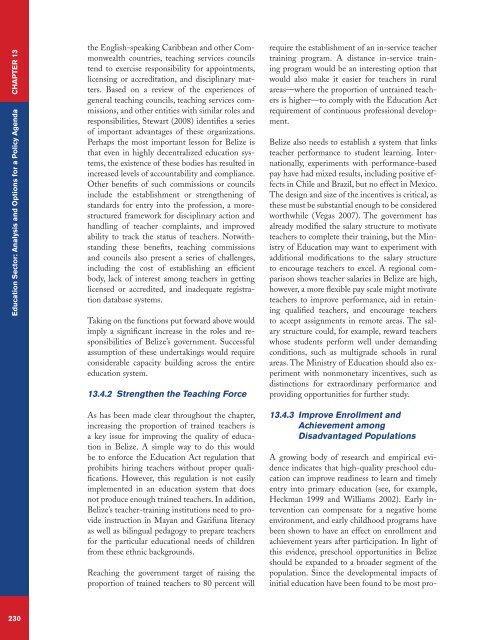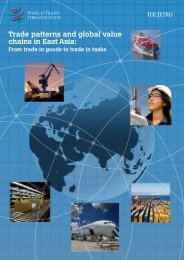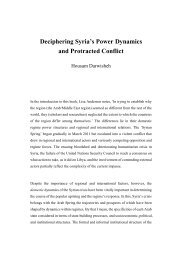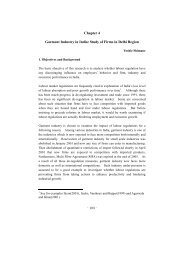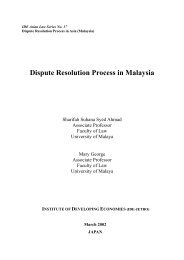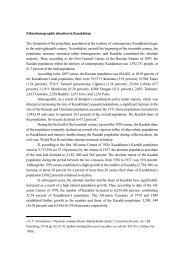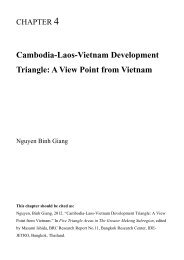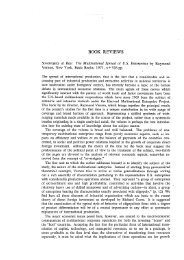Towards a Sustainable and Efficient State The Development ...
Towards a Sustainable and Efficient State The Development ...
Towards a Sustainable and Efficient State The Development ...
You also want an ePaper? Increase the reach of your titles
YUMPU automatically turns print PDFs into web optimized ePapers that Google loves.
chapter 13Education Sector: Analysis <strong>and</strong> Options for a Policy AgendaA growing body of research <strong>and</strong> empirical evidenceindicates that high-quality preschool educationcan improve readiness to learn <strong>and</strong> timelyentry into primary education (see, for example,Heckman 1999 <strong>and</strong> Williams 2002). Early interventioncan compensate for a negative homeenvironment, <strong>and</strong> early childhood programs havebeen shown to have an effect on enrollment <strong>and</strong>achievement years after participation. In light ofthis evidence, preschool opportunities in Belizeshould be exp<strong>and</strong>ed to a broader segment of thepopulation. Since the developmental impacts ofinitial education have been found to be most protheEnglish-speaking Caribbean <strong>and</strong> other Commonwealthcountries, teaching services councilstend to exercise responsibility for appointments,licensing or accreditation, <strong>and</strong> disciplinary matters.Based on a review of the experiences ofgeneral teaching councils, teaching services commissions,<strong>and</strong> other entities with similar roles <strong>and</strong>responsibilities, Stewart (2008) identifies a seriesof important advantages of these organizations.Perhaps the most important lesson for Belize isthat even in highly decentralized education systems,the existence of these bodies has resulted inincreased levels of accountability <strong>and</strong> compliance.Other benefits of such commissions or councilsinclude the establishment or strengthening ofst<strong>and</strong>ards for entry into the profession, a morestructuredframework for disciplinary action <strong>and</strong>h<strong>and</strong>ling of teacher complaints, <strong>and</strong> improvedability to track the status of teachers. Notwithst<strong>and</strong>ingthese benefits, teaching commissions<strong>and</strong> councils also present a series of challenges,including the cost of establishing an efficientbody, lack of interest among teachers in gettinglicensed or accredited, <strong>and</strong> inadequate registrationdatabase systems.Taking on the functions put forward above wouldimply a significant increase in the roles <strong>and</strong> responsibilitiesof Belize’s government. Successfulassumption of these undertakings would requireconsiderable capacity building across the entireeducation system.13.4.2 Strengthen the Teaching Forcerequire the establishment of an in-service teachertraining program. A distance in-service trainingprogram would be an interesting option thatwould also make it easier for teachers in ruralareas—where the proportion of untrained teachersis higher—to comply with the Education Actrequirement of continuous professional development.Belize also needs to establish a system that linksteacher performance to student learning. Internationally,experiments with performance-basedpay have had mixed results, including positive effectsin Chile <strong>and</strong> Brazil, but no effect in Mexico.<strong>The</strong> design <strong>and</strong> size of the incentives is critical, asthese must be substantial enough to be consideredworthwhile (Vegas 2007). <strong>The</strong> government hasalready modified the salary structure to motivateteachers to complete their training, but the Ministryof Education may want to experiment withadditional modifications to the salary structureto encourage teachers to excel. A regional comparisonshows teacher salaries in Belize are high,however, a more flexible pay scale might motivateteachers to improve performance, aid in retainingqualified teachers, <strong>and</strong> encourage teachersto accept assignments in remote areas. <strong>The</strong> salarystructure could, for example, reward teacherswhose students perform well under dem<strong>and</strong>ingconditions, such as multigrade schools in ruralareas. <strong>The</strong> Ministry of Education should also experimentwith nonmonetary incentives, such asdistinctions for extraordinary performance <strong>and</strong>providing opportunities for further study.As has been made clear throughout the chapter,increasing the proportion of trained teachers isa key issue for improving the quality of educationin Belize. A simple way to do this wouldbe to enforce the Education Act regulation thatprohibits hiring teachers without proper qualifications.However, this regulation is not easilyimplemented in an education system that doesnot produce enough trained teachers. In addition,Belize’s teacher-training institutions need to provideinstruction in Mayan <strong>and</strong> Garifuna literacyas well as bilingual pedagogy to prepare teachersfor the particular educational needs of childrenfrom these ethnic backgrounds.Reaching the government target of raising theproportion of trained teachers to 80 percent will13.4.3 Improve Enrollment <strong>and</strong>Achievement amongDisadvantaged Populations230


